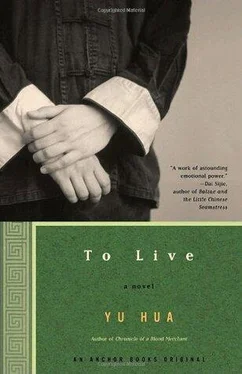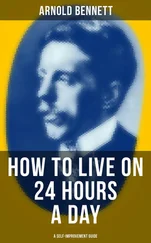Just how many different names can one ox have? My curiosity got the better of me, and I walked over to the edge of the field. As I approached the old man I asked him, “How many names does this ox have?”
The old man, using the plow to support himself, straightened up. After looking me over he asked, “You a city boy?”
“Uh huh,” I nodded.
The old man seemed pleased with himself. “I could tell right away.”
“Just how many names does this ox have?” I repeated.
“He’s got only one,” the old man replied. “He’s called Fugui.”
“But just now you called him a whole bunch of names.”
“Oh. ” The old man smiled and gestured cryptically for me to move closer. As I neared him it seemed as if he wanted to say something but stopped. When he saw the ox raise its head, he gave him a reprimand, “No eavesdropping! Lower your head!”
The ox did lower his head, and then the old man whispered to me, “I’m afraid he’ll discover he’s the only one working the field, so I call out some other names to fool him. If he hears that there are other oxen around working the fields, he’ll work harder and won’t feel so depressed.”
Seeing the old man’s dark face smiling in the sunlight was quite moving. The wrinkles on his face moved about happily. They were caked with mud, just like the small dirt trails that ran through the fields.
Afterward the old man and I sat down under that lush tree. And on that bright afternoon, he began to tell me about himself.
Forty years ago my dad would often stroll back and forth across this land. He would be wearing a black silk outfit and would always have his hands clasped behind his back. Just as he went out, he’d tell my mother, “I’m going out to take a walk around the property.”
The moment the workers saw Dad strolling around his land they would hold their hoes with both hands and respectfully call out, “Master.”
When my dad went into the city, all the city people would call him “sir.” My dad was of very high social status, but every time he squatted down to take a shit he was just like a poor man. He never liked relieving himself in the house on the chamber pot next to the bed. Just like the animals, he liked shitting out in the open. Every day as dusk would near, dad would let out a belch— the sound was almost exactly the same as that croaking sound that frogs make. Then he would step outside and slowly walk toward the manure vat.
When he got there he’d be annoyed that the side of the vat was dirty. He’d raise his leg and climb up, squatting on top. My dad was old and his shit was getting older with him; it was harder and harder to force out. Our whole family would hear his grunting and groaning coming all the way from the vat.
For decades my dad always shit like this. When he got to be over sixty he was still able to climb up there and squat for a long time. His legs had as much strength as the talons of an eagle. My dad liked to watch the sky gradually change color until the darkness enveloped his farmland. When my daughter, Fengxia, was three or four she would often run out to the edge of the village to watch grandpa taking a shit. Dad was really old by then. When he squatted up on the manure vat his legs would tremble a bit, and Fengxia would ask him, “Grandpa, why are you shaking?”
“It’s just the wind blowing,” Dad would reply.
At the time our family circumstances had yet to take a turn for the worse. Our family had over one hundred mu 1of land. The land from here all the way to the factory’s chimney over there was owned by my family. Near and far, my father and I were known as the old and young rich masters. When we walked, the sound our shoes made was like the sound of coins clanking against each other. My wife, Jiazhen, was the daughter of the owner of the rice store in the city. She was also born into a rich family. A wealthy woman marries a wealthy man — it’s like piling all the money up. The sound of money pouring down on top of money — it’s been forty years since I’ve heard that sound.
I’m the prodigal son of the Xu family — or, as my dad would say, I’m a bastard. I studied for a few years at an old-style private school. When the schoolteacher, wearing the traditional long gown, called on me to read a paragraph aloud, it was my happiest moment. I stood up, holding my string-bound edition of “The Thousand Word Essay,” and announced to my teacher, “Listen good now! Daddy’s going to read to you!”
The next time he saw my father, my teacher, who was really getting on in years, told him, “I guarantee you that when that son of yours grows up, he’ll be nothing but trouble.”
Ever since I was little I’ve been hopeless, as my father would say. My teacher used to say I was a rotten piece of wood that could not be carved. Now that I think about it, they were both right. But at the time that’s not how I saw things. I thought, I’ve got money, I’m the only flame the Xu family still has burning. If I’m extinguished, the Xu family will be finished.
When I was in private school I never walked anywhere — our family had a hired worker who would carry me on his back. When school got out he would already be waiting there, respectfully bent over. After I climbed on, I’d hit him on the head and say, “Changgen, let’s go!”
Our worker Changgen would start to run. I’d be on top, bobbing about like a sparrow on the branches of a tree. Then I’d say, “Fly!”
Changgen would take longer strides and jump as if he could fly.
When I got older I started to build up a taste for going into town. Sometimes I wouldn’t come home for ten or fifteen days. I wore a white silk shirt, and my hair was smooth and shiny. Standing in front of the mirror and seeing my head of black, flowing hair, I knew that I looked like a rich man.
I loved to go up to the whorehouse to listen to those loose women moaning and groaning all night long. Listening to those sounds was just like scratching a good itch. Once the day comes that a man starts to go whoring, gambling can’t be too far behind. Whoring and gambling are just like a pair of arms or legs: inseparable. Later I began to like gambling even more — whoring was just to loosen up a bit. Whoring is like drinking a lot of water and needing to relieve oneself, or, said bluntly, it’s like taking a piss. But gambling is completely different. Gambling made me both happy and tense. And it was especially that sense of tension that brought me an almost indescribable feeling of comfort. I was like a monk caught up in his daily routine of ringing the bell, completely listless. Every morning I’d wake up with my only worry being how I should spend the day. My father would sigh in despair, reprimanding me for failing to bring honor to our ancestors. I would think that bringing honor to our ancestors wasn’t my job alone. I would say to myself, why should I give up my days of fun to worry about boring stuff like honoring the ancestors? Moreover, when my dad was young he’d been just like me. Our family used to have over two hundred mu of land, but once my father got his hands on it he managed to lose over half. I said to my father, “Don’t worry, my son will honor the ancestors.”
We should leave something good for the next generation anyway. My mom laughed when she heard this, and later she secretly told me that Dad had once said the same thing to my grandfather. I thought, you see, he forces what he doesn’t want to do onto me. Why should I listen to him? At the time, my daughter, Fengxia, was just four years old, and Jiazhen was pregnant with our son, Youqing. Because she was six months pregnant, Jiazhen was naturally no treat for the eyes. When she walked it looked like she had a pair of steamed buns stuffed down her pants. Her legs didn’t go forward when she walked, but side to side. I remember being so annoyed by her appearance that I even said to her, “Look at you. As soon as the wind blows your stomach doubles in size.”
Читать дальше












